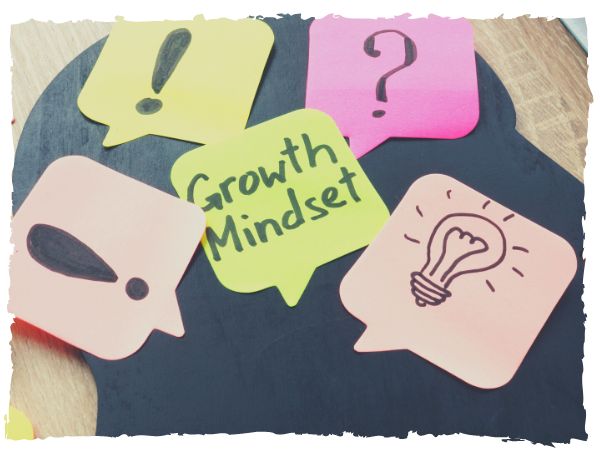There might be affiliate links on this page, which means we get a small commission of anything you buy. As an Amazon Associate we earn from qualifying purchases. Please do your own research before making any online purchase.
The concept of having a growth mindset has been around for as long as there have been great thinkers, but the term has only come into everyday use recently.
A focus on self-improvement that utilizes growth mindset goals is best described as believing that one's abilities and intelligence can be developed and improved through conscious effort and work.
This contrasts with a fixed mindset that sees fate as something unchangeable and that there is only so much a person can change about their lives and future.
Having a growth mindset can profoundly impact a person’s life in a positive way. In contrast, a fixed mindset and outlook limit the possibilities and keep the focus on a very narrow field of vision.
The bottom line is that motivated individuals are more likely to achieve their goals, no matter how big or small they might be. Solid growth mindset goals can make nearly every area and aspect of your life easier and more meaningful. Here is what you need to know!
What Are Growth Mindset Goals?
A growth mindset is an idea that hard work and study can improve your abilities and talents.
The growth mindset is all about being open to learning and growing, while the fixed mindset is more about believing you're already who you are. If you have a growth mindset, you'll be able to take on new challenges, learn from them, and grow—even if those things feel scary at first.
However, if you have a fixed mindset, setbacks or failures could cause you to give up before really giving everything you got. A fixed mindset is genuinely the exact opposite of a growth mindset.
It's the idea that you're either good at something and can’t improve on it very much, or you are not good at something, and it’s a waste of time and energy to try and change that.
Research has shown that individuals with a growth mindset are more successful in their endeavors. They are more productive and see better results in school, work, and other areas of life.
This is largely because they are better able to adapt to changing circumstances and are more likely to seek new growth and development opportunities.
Nurturing a growth mindset can lead to greater happiness and fulfillment since these individuals are usually more open to learning and more receptive to learning opportunities. Thanks to the positive outlook, they are also more likely to experience a sense of progress and accomplishment over time.
Benefits of Setting Growth Mindset Goals
Setting and achieving growth mindset goals can positively impact a person's overall well-being. Here are some ways that growth mindset goals and keystone habits can help someone mentally, physically, emotionally, and even spiritually:
Overall, a growth mindset represents a powerful tool for personal growth and development, offering individuals a way to approach challenges with a sense of optimism and possibility and continually strive for improvement in all areas of their lives.

Focusing on growth and self-improvement is vital for adults and young people, and growth mindset goals are becoming more prevalent among all ages and demographics today.
Tips for Setting Growth Mindset Goals
To best reach growth mindset goals, individuals should approach them with a sense of curiosity and openness and be willing to seek support and guidance as needed.
Knowing what specific goals you are pursuing, how to gauge your progress, and when you have accomplished said goal is vital to success and staying motivated.
Setting realistic and attainable goals and building on them as progress is made is a great way to make measurable and meaningful progress that can improve all areas of life. This is true of any goal whether that is improving critical thinking skills, being a better listener, or overcoming a work or relationship hurdle in life.
What does a growth mindset goal need to be successful? Every individual has different needs and goals, but in general, a good goal that includes these key elements, known as SMART elements:
By embracing the idea that our abilities and intelligence can be developed through hard work, persistence, and a willingness to learn from our mistakes, we can unlock our full potential and achieve our goals.
Focusing on and planning with these five criteria in mind, you can easily set useful and practical benchmarks as you work on being more mindful and growth-focused in your daily self-care and goal-setting.
10 Growth Mindset Goals to Model in the Year Ahead
Here is a list of specific growth mindset goals people could set for themselves to help in all areas of life, from improving mental health to becoming more confident or successful:
1. Learn a new skill
Why not try learning to play a musical instrument, cooking a new cuisine, or coding? It’s never too late.
Finding new life skills can be an enriching experience and allow small growth and open-mindedness to become a part of normal day-to-day activities and mindfulness.
2. Overcome a fear or phobia
Afraid of public speaking, flying, or heights? Pushing past the boundaries and stepping outside comfort zones is a big part of growth mindset goals and is a great way to be mindful and focused on the short and long-term goals.
3. Improve physical health and fitness
Start by setting achievable goals with this. Don’t just wake up one morning and run a marathon without training… not only would you likely fail, but possibly injure yourself. Try running a 5K, doing a set number of push-ups or pull-ups, or practicing yoga regularly.

Health-minded goals can be as specific and personal as needed, which makes them incredibly motivating.
4. Foster and invite a growth mindset
Welcome this mindset into your life by reading books, attending workshops, or listening to podcasts on the topic.
Building on personal reflection and introspection by expanding your experiences and thinking can do wonders in almost every area of life.
5. Build resilience
If you are at peace with yourself, you’ll become much more equipped to handle life’s speedbumps. Start by setting goals for managing stress, developing coping strategies, or practicing mindfulness meditation.
Stress is unavoidable, but knowing how to deal with it and use it as a tool rather than a hindrance is instrumental to continued growth.
6. Develop better relationship
Relationships are key to thriving in this world… we can’t go at it alone all the time, every time. Improve your relationships with friends, family, or colleagues. T
This mindset goal can be achieved by improving communication skills, practicing active listening, or seeking therapy or counseling to help overcome relationship strains.
7. Expand creativity
Set goals related to writing, drawing, painting, or other artistic endeavors. Allowing the mind room to be creative and fostering that creative streak, whatever form it takes, is essential to balanced growth and improvement.
8. Achieve career growth
When it comes to your career, it’s important to set both short and long-term goals. This could be anything from acquiring new skills, seeking professional development tools, or networking with others in the field to increase job standing and opportunities.
9. Build financial stability
You deserve to have the things you want and not stress about the things you need. You’ve earned it. In order to do this, try setting goals related to budgeting, saving, or investing.

The future is uncertain for everyone, and knowing that finances can be one less worry to carry around can also help make the here and now more enjoyable.
10. Learn a new language
Language is the key to the world. Literally. Start with an app, like Babbel or duolingo… and set achievable goals for vocabulary acquisition, grammar practice, or conversation skills.
Humans are social creatures and the more honest communication – oral and written- are, the more success a person can have in life.
There Are No One-Size-Fits-All Goals
Generally speaking, specific growth mindset goals will vary from individual to individual. What they set for themselves will depend on their interests, values, and aspirations, as well as their current level of knowledge and skill in various areas.
By setting achievable, specific, and meaningful goals, individuals can develop a growth mindset and achieve personal growth and development over time with good personal habits and routines.
Final Thoughts on Growth Mindset Goals
A growth mindset is a powerful way to approach life's challenges and achieve success. The importance of setting growth mindset goals that are specific, measurable, achievable, relevant, and time-bound cannot be overstated.
By adopting a growth mindset and setting growth-oriented goals, we can become more resilient, adaptive, and successful in all areas of day-to-day living.
Embrace the power of a growth mindset and strive for continuous improvement and personal growth. It’s never too late to get started.


